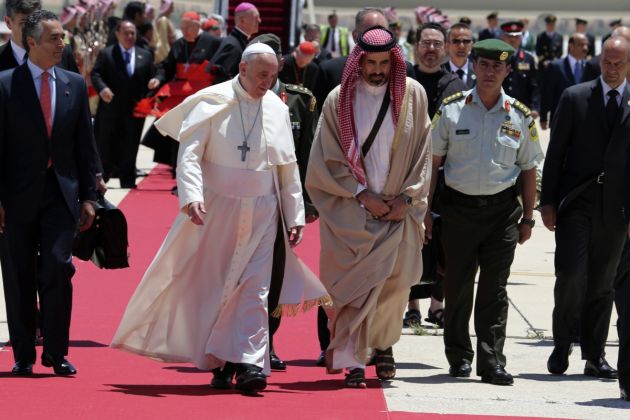Pope Francis begins three day trip to the Holy Land in Jordan

Pope Francis has arrived in the Jordanian capital Amman on his three-day visit to the Holy Land with crowds waving flags along the road and chanting "Long live the Pope," as he left the airport.
Many Chrisrians celebrate the baptism of Jesus by John the Baptsist on the banks of the River Jordan at Al-Maghta in Jordan.
When the 77-year-old pontiff spoke to Jordan's King Abdullah, Francis lauded the kingdom for its efforts to "to seek lasting peace for the entire region."
"This great goal urgently requires that a peaceful solution be found to the crisis in Syria, as well as a just solution to the Israeli-Palestinian conflict," said the Pope.
The Christian presence in the Holy Land and the Middle has diminished in recent years sometimes due to persecution and conflicts that have spurred emigration.
"The right to religious freedom 'includes on the individual and collective levels the freedom to follow one's conscience in religious matters and, at the same time, freedom of worship," said Francis when he spoke to the king and political and religious represenatives at the Royal Palace.
He said it also includes, "the freedom to choose the religion which one judges to be true and to manifest one's beliefs in public."
Live television showed Jordanian dignitaries and clergy from the region greeting the pontiff Saturday as he stepped from his aircraft.
Bedouin guards from the Jordanian armed forces saluted the leader of the world's 1.2 billion Catholics as he walked along the airport apron.
Francis spent Saturday in Jordan, where Christians are a small minority in a country where King Abdullah and his family are supporters of moderate Islam and organizers of inter-faith meetings.
Following predecessors John Paul II and Benedict XVI, Pope Francis travelled to the site on the banks of the River Jordan believed by some experts to be the exact spot where Jesus came to be baptised by John the Baptist.
The pontiff left Rome accompanied by a rabbi and a Muslim leader from his Argentine homeland on a trip in which he was expected to push inter-religious dialogue as a vehicle for peace in the region and ecumenical relations in global Christianity.
'POPE PAUL VI'S VISIT'
The trip comes on the 50th anniversary of Pope Paul VI's visit to the region when he met the Ecumenical Patriarch of Constantinople, Athenagoras, seen by many as the leader of Eastern Orthodox Christians. Francis will meet the current Ecumenical Patriarch, Bartholomew, on Sunday in Jerusalem.

In an interview with the Vatican newspaper L'Osservatore Romano on Friday Patriarch Bartholomew said, "There is no doubt that the historic meeting of our venerable predecessors, Ecumenical Patriarch Athenagoras and Pope Paul VI, marked a new beginning for relations between Roman Catholicism and Orthodoxy.
"We must remember that this event followed an entire millennium of mutual mistrust and theological estrangement between our two great traditions.
"Thus, despite our common history of Scripture and Tradition, both of our Churches ran the risk of damage through isolation and self-sufficiency, having followed separate ways since the eleventh century."
Vatican Radio reported that although Christians are only between 1 and 2 percent of the largely Sunni Muslim population, the Jordanian government has sought to foster good interfaith relations.
The Holy Land is a region where tensions between Muslims, Christians and Jews often make news headlines.
"King Abdullah and his influential family are strong supporters of the moderate Islamic voice, organising all kinds of interfaith encounters and promoting an annual World Week for interreligious harmony," reported Vatican Radio.
The Pew Research center shows in its Global Christianity report for 2011 that estimates of the Christian presence in the Middle East in terms the share of the overall population have dwindled from 10 percent in 1900 to 5 percent in 2010.